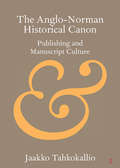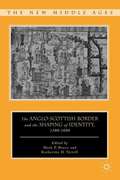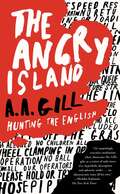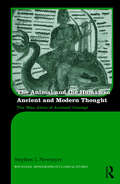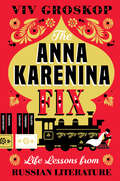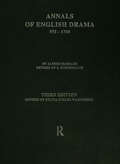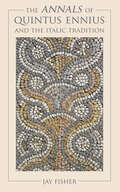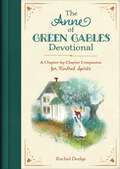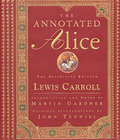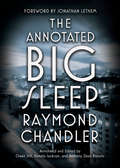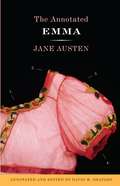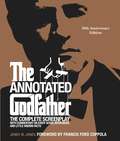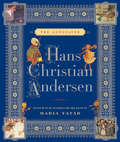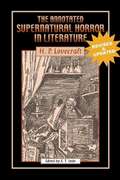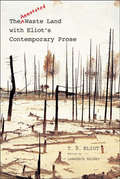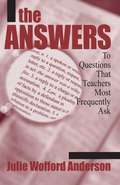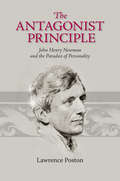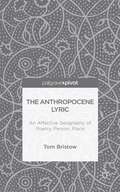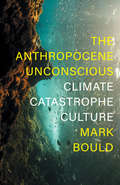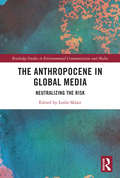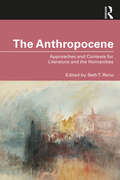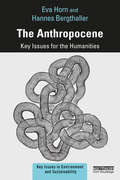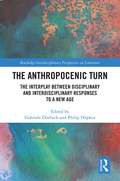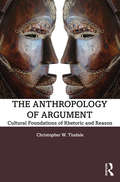- Table View
- List View
The Anglo-Norman Historical Canon: Publishing and Manuscript Culture (Elements in Publishing and Book Culture)
by Jaakko TahkokallioThis Element is a contribution to the ongoing debate on what it meant to publish a book in manuscript. It offers case-studies of three twelfth-century Anglo-Norman historians: William of Malmesbury, Henry of Huntingdon, and Geoffrey of Monmouth. It argues that the contemporary success and rapid attainment of canonical authority for their histories was in significant measure the result of successfully conducted publishing activities. These activities are analysed using the concept of a 'publishing circle'. This concept, it is suggested, may have wider utility in the study of authorial publishing in a manuscript culture. This Element is also available as Open Access.
The Anglo-Scottish Border and the Shaping of Identity, 1300–1600
by Mark P. Bruce Katherine H. Terrell"Theorizing the Borders: Scotland and the Shaping of Identity in Medieval Britain" explores the roles that Scotland and England play in one another's imaginations. This collection of essays brings together eminent scholars and emerging voices from the frequently divergent fields of English and Scottish medieval studies to address such questions as: How do subjects on both sides of the Anglo-Scottish border define themselves in relation to one another? In what ways do they influence each other's sense of historical, cultural, and national identity? What stories do they tell about one another, and to what ends? How does the shifting political balance - as well as the shifting border - between the two kingdoms complicate notions of Scottishness and Englishness? What happens to important texts, genres, and even poetic forms when they cross this border? How do texts produced in the Anglo-Scottish borderlands transform mainstream notions of Scottish and English identities?
The Angry Island: Hunting the English
by A.A. GillThink of England, and anger hardly springs to mind as its primary national characteristic. Yet in The Angry Island, A. A. Gill argues that, in fact, it is plain old fury that is the wellspring for England's accomplishments. The default setting of England is anger. The English are naturally, congenitally, collectively and singularly livid much of the time. They're incensed, incandescent, splenetic, prickly, touchy, and fractious. They can be mildly annoyed, really annoyed and, most scarily, not remotely annoyed. They sit apart on their half of a damply disappointing little island, nursing and picking at their irritations. The English itch inside their own skins. They feel foreign in their own country and run naked through their own heads. Perhaps aware that they're living on top of a keg of fulminating fury, the English have, throughout their history, come up with hundreds of ingenious and bizarre ways to diffuse anger or transform it into something benign. Good manners and queues, cul-de-sacs and garden sheds, and almost every game ever invented from tennis to bridge. They've built things, discovered stuff, made puddings, written hymns and novels, and for people who don't like to talk much, they have come up with the most minutely nuanced and replete language ever spoken -- just so there'll be no misunderstandings. The Angry Island by turns attacks and praises the English, bringing up numerous points of debate for Anglophiles and anyone who wonders about the origins of national identity. This book hunts down the causes and the results of being the Angry Island.
The Animal and the Human in Ancient and Modern Thought: The ‘Man Alone of Animals’ Concept (Routledge Monographs in Classical Studies)
by Stephen T. NewmyerAncient Greeks endeavored to define the human being vis-à-vis other animal species by isolating capacities and endowments which they considered to be unique to humans. This approach toward defining the human being still appears with surprising frequency, in modern philosophical treatises, in modern animal behavioral studies, and in animal rights literature, to argue both for and against the position that human beings are special and unique because of one or another attribute or skill that they are believed to possess. Some of the claims of man’s unique endowments have in recent years become the subject of intensive investigation by cognitive ethologists carried out in non-laboratory contexts. The debate is as lively now as in classical times, and, what is of particular note, the examples and methods of argumentation used to prove one or another position on any issue relating to the unique status of human beings that one encounters in contemporary philosophical or ethological literature frequently recall ancient precedents. This is the first book-length study of the ‘man alone of animals’ topos in classical literature, not restricting its analysis to Greco-Roman claims of man’s intellectual uniqueness, but including classical assertions of man’s physiological and emotional uniqueness. It supplements this analysis of ancient manifestations with an examination of how the commonplace survives and has been restated, transformed, and extended in contemporary ethological literature and in the literature of the animal rights and animal welfare movements. Author Stephen T. Newmyer demonstrates that the anthropocentrism detected in Greek applications of the ‘man alone of animals’ topos is not only alive and well in many facets of the current debate on human-animal relations, but that combating its negative effects is a stated aim of some modern philosophers and activists.
The Anna Karenina Fix: Life Lessons from Russian Literature
by Viv Groskop“In this hilarious, candid, and thought-provoking memoir, [Groskop] explains how she used lessons from Russian classics to understand herself better.” —Gretchen Rubin, #1 New York Times–bestselling authorAs Viv Groskop knows from personal experience, everything that has ever happened to a person has already happened in the Russian classics: from not being sure what to do with your life (Anna Karenina), to being hopelessly in love with someone who doesn’t love you back (Turgenev’s A Month in the Country), or being socially anxious about your appearance (all of Chekhov’s work). In The Anna Karenina Fix, a sort of literary self-help memoir, Groskop mines these and other works, as well as the lives of their celebrated creators, and her own experiences as a student of Russian, to answer the question “How should you live your life?” This is a charming and fiercely intelligent book, a love letter to Russian literature and an exploration of the answers these writers found to life’s questions.“[Groskop is] a delight, a reader’s reader whose professional and personal experiences have allowed her to write the kind of book that not only is complete unto itself, but makes you want to head to the library and revisit or discover the great works she loves.” —The Washington Post“Learn how to hack life nineteenth-century Russian style! You’ll totally be like Anna Karenina without getting (spoiler alert) run over by a train!” —Gary Shteyngart, New York Times-bestselling author“For anyone intimidated by Russia’s daunting literary heritage, this humorous yet thoughtful introduction will serve as the perfect entrée.” —Publishers Weekly
The Annals of English Drama 975-1700: An Analytical Record Of All Plays, Extant Or Lost, Chronologically Arranged And Indexed By Authors, Titles, Dramatic Companies
by Sylvia Stoler WagonheimAn analytical record of all plays, extinct or lost, chronologically arranged and indexed by authors, titles and dramatic companies.
The Annals of Quintus Ennius and the Italic Tradition
by Jay FisherA fresh look at the multicultural influences on Quintus Ennius and his epic poem, the Annals.Quintus Ennius, often considered the father of Roman poetry, is best remembered for his epic poem, the Annals, a history of Rome from Aeneas until his own lifetime. Ennius represents an important bridge between Homer’s works in Greek and Vergil’s Aeneid. Jay Fisher argues that Ennius does not simply translate Homeric models into Latin, but blends Greek poetic models with Italic diction to produce a poetic hybrid. Fisher's investigation uncovers a poem that blends foreign and familiar cultural elements in order to generate layers of meaning for his Roman audience.Fisher combines modern linguistic methodologies with traditional philology to uncover the influence of the language of Roman ritual, kinship, and military culture on the Annals. Moreover, because these customs are themselves hybrids of earlier Roman, Etruscan, and Greek cultural practices, not to mention the customs of speakers of lesser-known languages such as Oscan and Umbrian, the echoes of cultural interactions generate layers of meaning for Ennius, his ancient audience, and the modern readers of the fragments of the Annals.
The Anne of Green Gables Devotional: A Chapter-by-Chapter Companion for Kindred Spirits
by Rachel DodgeDevotional Inspiration Especially for Kindred Spirits The Anne of Green Gables Devotional offers lovely inspiration that explores the theme of God's love and faithfulness through the pages of the classic L. M. Montgomery novel, cherished by generations of readers. Each reading corresponds with a chapter from the book and invites you to embrace God's redemptive plans for your life as His very own adopted daughter in Christ. This beautiful 40-day devotional includes original artwork throughout, and each reading includes examples from the novel, scripture, life application, prayers, and discussion questions perfect for groups, book clubs, or personal reflection. It's perfect as a personal read or gift for a bosom friend!
The Annotated Alice: The Definitive Edition (The Annotated Books)
by Lewis Carroll Martin Gardner John TennielThe culmination of a lifetime of scholarship, The Annotated Alice is a landmark event in the rich history of Lewis Carroll and cause to celebrate the remarkable career of Martin Gardner. For over half a century, Martin Gardner has established himself as one of the world's leading authorities on Lewis Carroll. His Annotated Alice, first published in 1959, has over half a million copies in print around the world and is beloved by both families and scholars--for it was Gardner who first decoded many of the mathematical riddles and wordplay that lay ingeniously embedded in Carroll's two classic stories, Alice's Adventures in Wonderland and Through the Looking Glass. Forty years after this groundbreaking publication, Norton is proud to publish the Definitive Edition of The Annotated Alice, a work that combines the notes of Gardner's 1959 edition with his 1990 volume, More Annotated Alice, as well as additional discoveries drawn from Gardner's encyclopedic knowledge of the texts. Illustrated with John Tenniel's classic, beloved art--along with many recently discovered Tenniel pencil sketches--The Annotated Alice will be Gardner's most beautiful and enduring tribute to Carroll's masterpieces yet.
The Annotated Big Sleep
by Raymond ChandlerThe first fully annotated edition of Raymond Chandler&’s 1939 classic The Big Sleep features hundreds of illuminating notes and images alongside the full text of the novel and is an essential addition to any crime fiction fan&’s library. A masterpiece of noir, Raymond Chandler's The Big Sleep helped to define a genre. Today it remains one of the most celebrated and stylish novels of the twentieth century. This comprehensive, annotated edition offers a fascinating look behind the scenes of the novel, bringing the gritty and seductive world of Chandler's iconic private eye Philip Marlowe to life. The Annotated Big Sleep solidifies the novel&’s position as one of the great works of American fiction and will surprise and enthrall Chandler&’s biggest fans. Including: -Personal letters and source texts -The historical context of Chandler&’s Los Angeles, including maps and images -Film stills and art from the early pulps -An analysis of class, gender, sexuality, and ethnicity in the novel
The Annotated Emma
by Jane Austen David M. ShapardFrom the editor of the popular Annotated Pride and Prejudice comes an annotated edition of Jane Austen's Emma that makes her beloved tale of an endearingly inept matchmaker an even more satisfying read. Here is the complete text of the novel with more than 2,200 annotations on facing pages, including: -Explanations of historical context-Citations from Austen's life, letters, and other writings-Definitions and clarifications-Literary comments and analysis-Maps of places in the novel-An introduction, bibliography, and detailed chronology of events-Nearly 200 informative illustrations Filled with fascinating information about everything from the social status of spinsters and illegitimate children to the shopping habits of fashionable ladies to English attitudes toward gypsies, David M. Shapard's Annotated Emma brings Austen's world into richer focus.
The Annotated Godfather: 50th Anniversary Edition with the Complete Screenplay, Commentary on Every Scene, Interviews, and Little-Known Facts
by Jenny M. JonesCelebrating the 50th anniversary of The Godfather, this authorized, annotated and illustrated edition of the complete, unedited screenplay includes all the little-known facts, behind-the-scenes intrigue, and first-person reflections from cast and crew members on the making of this landmark film.From its ingenious cinematic innovations and memorable, oft-quoted script to its iconic cast, including Marlon Brando, Al Pacino, Robert Duvall, James Caan, The Godfather is considered by many to be the greatest movie ever made. And yet, the history of its making is so colorful, so chaotic, that one cannot help but marvel at the seemingly insurmountable odds it overcame to become a true cinematic masterpiece, and a film that continues to captivate its audience decades after its release.In this authorized, annotated, and illustrated edition of the complete screenplay, nearly every scene is examined and dissected, including: Fascinating commentary on technical details about the filming and shooting locationsTales from the set, including arguments, accidents, anecdotes and practical jokesProfiles of the actors and stories of how they were castDeleted scenes that never made the final cut, and the goofs and gaffes that didAnd much more!Interviews with former Paramount executives, cast and crew members, and director Francis Ford Coppola, round out the commentary and shed new light on everything you thought you knew about this most influential film. With more than 200 photographs, this a truly unique, collectable keepsake for every Godfather fan.
The Annotated Hans Christian Andersen (The Annotated Books)
by Hans Christian Andersen Maria Tatar Julie K. AllenA richly entertaining and informative collection of Hans Christian Andersen's stories, annotated by one of America's leading folklore scholars. In her most ambitious annotated work to date, Maria Tatar celebrates the stories told by Denmark's "perfect wizard" and re-envisions Hans Christian Andersen as a writer who casts his spell on both children and adults. Andersen's most beloved tales, such as "The Emperor's New Clothes," "The Ugly Duckling," and "The Little Mermaid," are now joined by "The Shadow" and "Story of a Mother," mature stories that reveal his literary range and depth. Tatar captures the tales' unrivaled dramatic and visual power, showing exactly how Andersen became one of the world's ten most translated authors, along with Shakespeare, Dickens, and Marx. Lushly illustrated with more than one hundred fifty rare images, many in full color, by artists such as Arthur Rackham and Edmund Dulac, The Annotated Hans Christian Andersen will captivate readers with annotations that explore the rich social and cultural dimensions of the nineteenth century and construct a compelling portrait of a writer whose stories still fascinate us today.
The Annotated Supernatural Horror In Literature: Revised And Expanded
by S. T. Joshi Howard Phillips LovecraftH. P. Lovecraft's "Supernatural Horror in Literature," first published in 1927, is widely recognized as the finest historical survey of horror literature ever written. The product of both a keen critical analyst and a working practitioner in the field, the essay affords unique insights into the nature, development, and history of the weird tale. Beginning with instances of weirdness in ancient literature, Lovecraft proceeds to discuss horror writing in the Renaissance, the first Gothic novels of the late 18th century, the revolutionary importance of Edgar Allan Poe, the work of such leading figures as Nathaniel Hawthorne, Ambrose Bierce, and William Hope Hodgson, and the four "modern masters"-Arthur Machen, Lord Dunsany, Algernon Blackwood and M. R. James. In this annotated edition of Lovecraft's seminal work, acclaimed Lovecraft scholar S. T. Joshi has supplied detailed commentary on many points. In addition, Joshi has supplied a comprehensive bibliography of all the authors and works discussed in the essay, with references to modern editions and critical studies. For this new edition, Joshi has exhaustively revised and updated the bibliography and also revamped the notes to bring the book in line with the most up-to-date scholarship on Lovecraft and weird fiction. The entire volume has also been redesigned for ease of reading and reference. This new electronic edition will be invaluable both to devotees of Lovecraft and to enthusiasts of the weird tale.
The Annotated U.S. Constitution and Declaration of Independence
by Jack N. RakoveHere in a newly annotated edition are the two founding documents of the United States of America: the Declaration of Independence (1776), our great revolutionary manifesto, and the Constitution (1787–88), in which “We the People” forged a new nation and built the framework for our federal republic. Together with the Bill of Rights and the Civil War amendments, these documents constitute what James Madison called our “political scriptures” and have come to define us as a people. Now a Pulitzer Prize–winning historian serves as a guide to these texts, providing historical contexts and offering interpretive commentary. In an introductory essay written for the general reader, Jack N. Rakove provides a narrative political account of how these documents came to be written. In his commentary on the Declaration of Independence, Rakove sets the historical context for a fuller appreciation of the important preamble and the list of charges leveled against the Crown. When he glosses the Constitution, the Bill of Rights, and the subsequent amendments, Rakove once again provides helpful historical background, targets language that has proven particularly difficult or controversial, and cites leading Supreme Court cases. A chronology of events provides a framework for understanding the road to Philadelphia. The general reader will not find a better, more helpful guide to our founding documents than Jack N. Rakove.
The Annotated Waste Land with Eliot's Contemporary Prose
by Lawrence RaineyOne of the twentieth century's most powerful-and controversial-works, The Waste Land was published in the desolate wake of the First World War. This definitive edition of T.S. Eliot's masterpiece presents a new and authoritative version of the poem, along with all the essays Eliot wrote as he was composing The Waste Land, seven of them never before published in book form. The volume is enriched with period photographs and a London map of locations mentioned in the poem. Featured in the book are Lawrence Rainey's groundbreaking account of how The Waste Land came to be composed; a history of the reactions of admirers and critics; and full annotations to the poem and Eliot's essays. The edition transforms our understanding of one of the greatest modernist writers and the magnificent poem that became a landmark in literary history.
The Answers: To Questions That Teachers Most Frequently Ask
by Julie Wofford AndersonJulie Wofford Anderson, teacher and educational consultant, uses her years on the front lines to answer the most commonly asked real-life questions of pre-service as well as first and second-year teachers. Her experience supervising teachers and training student teachers provides her with the unique ability to have field-tested answers ready before the questions are asked!Sample questions include: What can I do to command respect from my students? When am I supposed to do all this stuff and teach as well? What are rubrics exactly? How can I establish good discipline in my classroom? What do I do with unreasonable demands by vocal and difficult parents?This practical "been there, done that" approach to overcoming the most common problems facing new teachers today will save time and effort and put you on the path to success. A must for every new and pre-service teacher in K¬-12.
The Antagonist Principle: John Henry Newman and the Paradox of Personality (Victorian Literature and Culture Series)
by Lawrence PostonThe Antagonist Principle is a critical examination of the works and sometimes controversial public career of John Henry Newman (1801-1890), first as an Anglican and then as Victorian England's most famous convert to Roman Catholicism at a time when such a conversion was not only a minority choice but in some quarters a deeply offensive one. Lawrence Poston adopts the idea of personality as his theme, not only in the modern sense of warring elements in one's own temperament and relationships with others but also in a theological sense as a central premise of orthodox Trinitarian Christian doctrine. The principle of "antagonism," in the sense of opposition, Poston argues, activated Newman's imagination while simultaneously setting limits to his achievement, both as a spiritual leader and as a writer. The author draws on a wide variety of biographical, historical, literary, and theological scholarship to provide an "ethical" reading of Newman's texts that seeks to offer a humane and complex portrait. Neither a biography nor a revelation of a life, this textual study of Newman's development as a theologian in his published works and private correspondence attempts to resituate him as one of the most combative of the Victorian seekers. Though his spiritual quest took place on the far right of the religious spectrum in Victorian England, it nonetheless allied him with a number of other prominent figures of his generation as distinct from each other as Thomas Carlyle, John Stuart Mill, and Walter Pater. Avoiding both hagiography and iconoclasm, Poston aims to "see Newman whole."
The Anthropocene Lyric: An Affective Geography of Poetry, Person, Place
by Tom BristowThis book takes the work of three contemporary poets-John Burnside, John Kinsella and Alice Oswald-to reveal how an environmental poetics of place is of significant relevance for the Anthropocene: a geological marker asking us to think radically of the human as one part of the more-than-human world.
The Anthropocene Unconscious: Climate Catastrophe Culture
by Mark BouldFrom Ducks, Newburyport to zombie movies and the Fast and Furious franchise, how climate anxiety permeates our cultureThe art and literature of our time is pregnant with catastrophe, with weather and water, wildness and weirdness. The Anthropocene - the term given to this geological epoch in which humans, anthropos, are wreaking havoc on the earth - is to be found bubbling away everywhere in contemporary cultural production. Typically, discussions of how culture registers, figures and mediates climate change focus on 'climate fiction' or 'cli-fi', but The Anthropocene Unconscious is more interested in how the Anthropocene and especially anthropogenic climate destabilisation manifests in texts that are not overtly about climate change - that is, unconsciously. The Anthropocene, Mark Bould argues, constitutes the unconscious of 'the art and literature of our time'.Tracing the outlines of the Anthropocene unconscious in a range of film, television and literature - across a range of genres and with utter disregard for high-low culture distinctions - this playful and riveting book draws out some of the things that are repressed and obscured by the term 'the Anthropocene', including capital, class, imperialism, inequality, alienation, violence, commodification, patriarchy and racial formations. The Anthropocene Unconscious is about a kind of rewriting. It asks: what happens when we stop assuming that the text is not about the anthropogenic biosphere crises engulfing us? What if all the stories we tell are stories about the Anthropocene? About climate change?
The Anthropocene in Global Media: Neutralizing the risk (Routledge Studies in Environmental Communication and Media)
by Leslie SklairThis book offers the first systematic study of how the ‘Anthropocene’ is reported in mass media globally, drawing parallels between the use (or misuse) of the term and the media’s attitude towards the associated issues of climate change and global warming. Identifying the potential dangers of the Anthropocene provides a useful path into a variety of issues that are often ignored, misrepresented, or sidelined by the media. These dangers are widely discussed in the social sciences, environmental humanities, and creative arts, and this book includes chapters on how the contributions of these disciplines are reported by the media. Our results suggest that the natural science and mass media establishments, and the business and political interests which underpin them, tend to lean towards optimistic reassurance (the ‘good’ Anthropocene), rather than pessimistic alarmist stories, in reporting the Anthropocene. In this volume, contributors explore how dangerous this ‘neutralizing’ of the Anthropocene is in undermining serious global action in the face of the potential existential risks confronting humanity. The book presents results from media in more than 100 countries in all major languages across the globe. It covers the reporting of key environmental issues, such as the impact of climate change and global warming on oceans, forests, soil, biodiversity, and the biosphere. We offer explanations for differences and similarities in how the media report the Anthropocene in different regions of the world. In doing so, the book argues that, though it is still controversial, the idea of the Anthropocene helps to concentrate minds and behaviour in confronting ongoing ecological (and Coronavirus) crises. The Anthropocene in Global Media will be of interest to students and scholars of environmental studies, media and communication studies, and the environmental humanities, and all those who are concerned about the survival of humans on planet Earth.
The Anthropocene: Approaches and Contexts for Literature and the Humanities
by Seth T. RenoPerhaps no concept has become dominant in so many fields as rapidly as the Anthropocene. Meaning "The Age of Humans," the Anthropocene is the proposed name for our current geological epoch, beginning when human activities started to have a noticeable impact on Earth’s geology and ecosystems. Long embraced by the natural sciences, the Anthropocene has now become commonplace in the humanities and social sciences, where it has taken firm enough hold to engender a thoroughgoing assessment and critique. Why and how has the geological concept of the Anthropocene become important to the humanities? What new approaches and insights do the humanities offer? What narratives and critiques of the Anthropocene do the humanities produce? What does it mean to study literature of the Anthropocene? These are the central questions that this collection explores. Each chapter takes a decidedly different humanist approach to the Anthropocene, from environmental humanities to queer theory to race, illuminating the important contributions of the humanities to the myriad discourses on the Anthropocene. This volume is designed to provide concise overviews of particular approaches and texts, as well as compelling and original interventions in the study of the Anthropocene. Written in an accessible style free from disciplinary-specific jargon, many chapters focus on well-known authors and texts, making this collection especially useful to teachers developing a course on the Anthropocene and students undertaking introductory research. This collection provides truly innovative arguments regarding how and why the Anthropocene concept is important to literature and the humanities.
The Anthropocene: Key Issues for the Humanities (Key Issues in Environment and Sustainability)
by Eva Horn Hannes BergthallerThe Anthropocene is a concept which challenges the foundations of humanities scholarship as it is traditionally understood. It calls not only for closer engagement with the natural sciences but also for a synthetic approach bringing together insights from the various subdisciplines in the humanities and social sciences which have addressed themselves to ecological questions in the past. This book is an introduction to, and structured survey of, the attempts that have been made to take the measure of the Anthropocene, and explores some of the paradigmatic problems which it raises. The difficulties of an introduction to the Anthropocene lie not only in the disciplinary breadth of the subject, but also in the rapid pace at which the surrounding debates have been, and still are, unfolding. This introduction proposes a conceptual map which, however provisionally, charts these ongoing discussions across a variety of scientific and humanistic disciplines. This book will be essential reading for students and researchers in the environmental humanities, particularly in literary and cultural studies, history, philosophy, and environmental studies.
The Anthropocenic Turn: The Interplay between Disciplinary and Interdisciplinary Responses to a New Age (Routledge Interdisciplinary Perspectives on Literature)
by Gabriele Dürbeck Philip HüpkesThis interdisciplinary volume discusses whether the increasing salience of the Anthropocene concept in the humanities and the social sciences constitutes an "Anthropocenic turn." The Anthropocene discourse creates novel conceptual configurations and enables scholars to re-negotiate and re-contextualize long-established paradigms, premises, theories and methodologies. These innovative constellations stimulate fresh research in many areas of thought and practice. The contributors to this volume respond to the proposition of an "Anthropocene turn" from the perspective of diverse research fields, including history of science, philosophy, environmental humanities and political science as well as literary, art and media studies. Altogether, the collection reveals to which extent the Anthropocene concept challenges deep-seated assumptions across disciplines. It invites readers to explore the wealth of scholarly perspectives on the Anthropocene as well as unexpected inter- and transdisciplinary connections.
The Anthropology of Argument: Cultural Foundations of Rhetoric and Reason
by Christopher W. TindaleThis innovative text reinvigorates argumentation studies by exploring the experience of argument across cultures, introducing an anthropological perspective into the domains of rhetoric, communication, and philosophy. The Anthropology of Argument fills an important gap in contemporary argumentation theory by shifting the focus away from the purely propositional element of arguments and onto how they emerge from the experiences of peoples with diverse backgrounds, demonstrating how argumentation can be understood as a means of expression and a gathering place of ideas and styles. Confronting the limitations of the Western tradition of logic and searching out the argumentative roles of place, orality, myth, narrative, and audience, it examines the nature of multi-modal argumentation. Tindale analyzes the impacts of colonialism on the field and addresses both optimistic and cynical assessments of contextual differences. The results have implications for our understanding of contemporary argumentative discourse in areas marked by deep disagreement, like politics, law, and social policy. The book will interest scholars and upper-level students in communication, philosophy, argumentation theory, anthropology, rhetoric, linguistics, and cultural studies.
